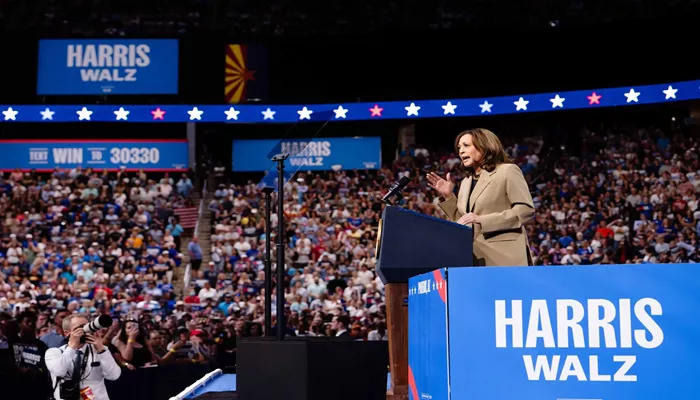Vice President Kamala Harris, the Democratic presidential nominee, has come under heavy fire from Republicans, led by Donald J. Trump, over her immigration record. In response, Harris is now attempting to counter this criticism by emphasizing a tough-on-crime stance, which Democrats believe has been effective in past elections.
Republicans have relentlessly criticized Harris for the Biden administration’s policies at the border. This issue has become one of her major vulnerabilities with voters. To address these attacks, Harris is positioning herself as a strong advocate for border security, a move that marks her clearest stance yet on the matter.
This week, Harris pledged to strengthen border security if elected and criticized Trump for his role in derailing a bipartisan border deal in Congress. Her campaign has also toned down some of the more progressive views she held during her 2019 bid for the Democratic nomination, such as her previous stance against criminal penalties for unauthorized border crossings.
Speaking at a rally in Arizona, a key swing state, Harris highlighted her experience as California’s attorney general, a position in which she targeted transnational gangs, drug cartels, and human traffickers. “I went after the transnational gangs, the drug cartels, and human traffickers. I prosecuted them in case after case, and I won,” Harris said, underscoring her commitment to border security.
In addition to her speeches, Harris’s campaign launched a television advertisement aimed at voters in battleground states. The ad promises to “hire thousands more border agents and crack down on fentanyl and human trafficking.” Notably, the ad does not mention undocumented immigrants already in the United States, an issue important to many progressives and immigration activists. However, Harris did stress the need for “comprehensive reform” that includes “an earned pathway to citizenship” in her Arizona speech.
No Democratic nominee has taken such a tough stance on border security since Bill Clinton. This shift reflects a change in public opinion since Trump left office in 2021, with more Americans, including Democrats and Latino voters, showing support for stricter immigration measures.
The Republican rhetoric on immigration has become increasingly harsh, with border crossings surging during the Biden administration, although recent measures have led to a sharp decline. For Harris, the challenge is whether her new messaging will resonate with voters who may have already formed opinions about her record.
The Trump campaign has identified immigration as one of Harris’s most significant weaknesses and has attempted to hold her accountable for the Biden administration’s policies, dubbing her the “border czar.” This title exaggerates her actual role, which focuses on addressing the root causes of migration from Latin America.
Democratic polling has also highlighted concerns about Harris’s immigration record. A recent survey by the Democratic group Blueprint found that immigration-related attacks were the most effective against Harris, even more so than those related to the economy and inflation. Other polls indicate that voters trust Trump more than Harris on border issues. However, if Harris can effectively counter Republican attacks on immigration, she may be able to shift the focus to issues more favorable to Democrats, such as abortion.
Harris’s decision to emphasize her record as California’s attorney general as a “border-state prosecutor” contrasts with her approach during the 2020 Democratic primary, where she supported making public healthcare available to undocumented immigrants.
Trump has used dark and fear-mongering language to attack Harris on immigration, falsely portraying migrants as a threat to Americans. At a rally in Montana, Trump claimed, “Every day, Kamala is letting migrant criminals roam free to assault, rape, mutilate, and kill our citizens.”
Some Republicans, like Chris DeRose, a former clerk of courts in Arizona’s Maricopa County, remain skeptical of Harris’s rhetoric. “She’s part of the Biden-Harris administration,” DeRose said. “There’s going to be some skepticism.”
Harris and her allies have attempted to turn Trump’s immigration record into a campaign issue. This year, Trump successfully persuaded Senate Republicans to block a bill supported by Biden and Harris that would have mandated border closures when migrant numbers reached certain levels and expanded detentions and deportations. “Donald Trump tanked the deal,” Harris said in Arizona, as the crowd booed. “Because he thought by doing that, it would help him win an election.”
Jen Cox, a senior adviser for the Harris campaign in Arizona, noted that Democrats in the state, including Senator Mark Kelly, have won elections with tougher messages on immigration. “Voters want to see folks be serious about actually fixing the broken immigration system and securing the border,” Cox said. “They don’t want to see folks play politics with it.”
In a recent special election in New York, Democrat Tom Suozzi won a competitive House race by criticizing Trump for the scuttled border deal and taking unusually hard-line stances for his party, including calls to temporarily shut down the border and deport migrants who assault the police. “The most effective politician is the one that says what the people are thinking already,” Suozzi said. “And people are talking about this issue. They are very much concerned about it. And the vice president can continue to emphasize that, yes, we recognize this is a problem, and we are willing to compromise to solve the problem, unlike the other side.”
Harris’s move to the center on immigration has been influenced by her time as vice president. Mike Madrid, a GOP consultant focused on Latino voters, noted that her pledge to sign the border security bill and the security-focused message of her new ad reflect broader changes among Democrats. Since the Obama years, Democrats have tried to balance increased border security with paths to legal residency and citizenship for undocumented immigrants in the U.S. However, the growing Latino electorate, now consisting mostly of third- and fourth-generation voters, is more removed from the immigration experience.
“This doesn’t mean you have to go all Donald Trump on immigration,” Madrid said. “It means you have to lead with border security and then weave in the elements of immigration reform later.”


